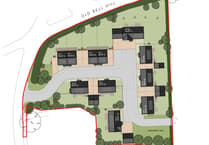MORE than 180 new homes will be built on the edge of Exeter, despite concerns about overdevelopment.
The Tilia Homes application for land at Aldens Farm in Alphington was narrowly approved by Exeter City Council’s planning committee on Monday, March 27, after it increased from a previously suggested 116 properties.
The development forms part of the wider South West Exeter scheme, which is expected to facilitate around 2,500 new homes along with land for employment, including a school, shops and a community centre.
The Aldens Farm site, which received outline planning permission in 2021, will feature a mix of one, two and four-bedroomed properties, including two blocks of flats.
Around 30 per cent of the 182 homes will be “affordable” with 10 per cent public open space.
However, a number of speakers at the meeting were against the proposal, criticising the amount of housing that will be built on the two former agricultural fields.
Juliet Meadowcroft, chairman of the Alphington Village Forum, stressed they were “not NIMBYs” (not in my back yard). She said: “We are not fighting against the principle of development, but against the effects it causes if not done in a reasonable way, taking into account the surrounding area, the capacity of the local roads, and the existing residents.
“This revised application is not at all reasonable as it nearly doubles the density that was approved in the outline plans, which can only be down to making more profit.
“The other South West Exeter site being developed in our village has nearly half the density of this one!”
She added: “Another big problem is the traffic congestion from which our village is already suffering on a regular basis, especially when there is any problem on the A38 or M5.
“Chudleigh Road is the most direct route into Exeter from the South West and we now have another 2,500 new houses being built all around us, with no new infrastructure.”
Local councillor Steve Warwick (Labour, Alphington), who lives nearby, claimed it is the “last piece of agricultural land in Alphington”.
He said: “People are concerned about the traffic flows in Alphington.
“They are concerned about the densities.
“They are concerned about the environment we end up living in, so I’d ask you to consider that.”
Cllr Warwick also requested a crossing for adjoining Shillingford Road, which he described as an “extremely dangerous” road.
He was later told there would be a crossing to the north-west of the development.
Speaking in favour, Ben Smith from Tilia Homes said the plan for one, two and four-bedroomed properties was to “make the most use of the land” which meant it could provide more affordable properties.
He added it would provide around £4 million in developer contributions to local services and infrastructure, while the developer had “looked to utilise materials to match the surrounding area”.
Following questioning, Mr Smith admitted the scheme would not be net zero, but said there are “likely” to be solar panels on most of the properties and a cycle store for each.
Recommending approval, the planning officer’s report said the “increased number of dwellings has addressed the material considerations set out in this report” and said the mix of housing is “needed”.
“This site is allocated and forms a connection from Alphington to the South West Exeter development currently under construction”, it added.
But some members of the committee objected.
Cllr Rob Hannaford (Labour, Exwick) said: “I think this application presents itself almost as a broken promise to Alphington, because of the changes in the density of this development.
“I think this feels like a city centre development”, he added, going on to criticise how some of the garden sizes are less than the council’s own criteria, while he was also unimpressed at most of the social housing being provided in flats.
“For me, it’s overdevelopment and it’s setting a dangerous precedent for the other urban extensions we’ve got around the city,” Cllr Hannaford said.
Green councillor Diana Moore (St David’s) agreed, stating: “There’s a number of really concerning urban design, ecological and transport issues within the site … that I don’t feel have been addressed.”
However, the chair of the planning committee Emma Morse (Labour, Mincinglake and Whipton) concluded: “I do have some concerns about design, but not enough to outweigh the need for housing on that site and the need to make the best use of land that we possibly can…”
Members approved the application by seven votes to five.





Comments
This article has no comments yet. Be the first to leave a comment.